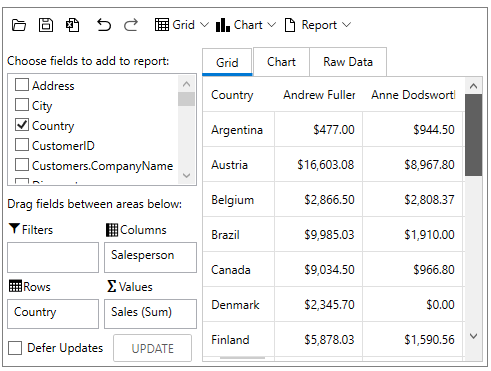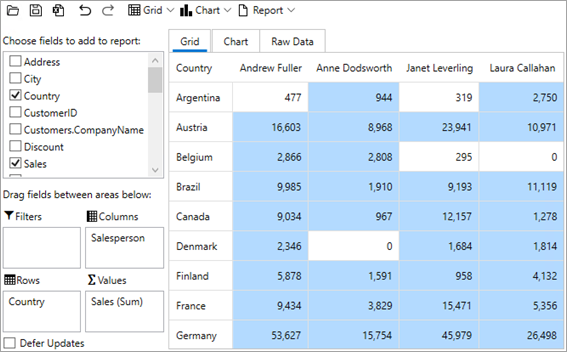Formatting
FlexPivot allows you to format the information contained in the pivot grid. It lets you format and represent numeric data in various formats and apply conditional formatting to a cell or range of cells in pivot grid. The following sections describe these formatting in detail.
Numeric data Formatting
FlexPivot provides the option to format and represent numeric data in various formats such as number, currency, scientific, and percentage. You can also use custom format so that the numbers appears the way you want. The formatting can be done at runtime or through code as described in the following sections.

Format Numeric Data at Runtime
Right-click a field in the Values list in the pivot panel.
Click Field Settings option in the context menu to open Field Settings dialog.
Click the Format tab and select one of the following options.
Number Formats the data as a number such as 1,235. You can specify the number of decimal places, and whether to use thousand separator (,) or not. Currency Formats the data as currency. You can specify the number of decimal places. Percentage Formats the data as percentage. You can specify the number of decimal places. Scientific Formats the data in scientific notation. You can specify the number of decimal places. Custom Applies a custom format to the data. Click OK and observe how the format of numeric data changes.
Format Numeric Data Programmatically
You can format numeric data programmatically using the Format property and standard numeric format strings. Following enlisted are the accepted format strings that can be used in code.
| "N" or "n" | Numeric | Formats data as h numbers such as 1,k235. You can specify the number of decimal places and whether to use thousand separator (,) or not. |
|---|---|---|
| "C" or "c" | Currency | Formats the data as currency. You can specify the number of decimal places. |
| "P" or "p" | Percentage | Formats the data as percentage. You can specify the number of decimal places. |
| "E" or "e" | Scientific | Formats the data in scientific notation. You can specify the number of decimal places. |
| Non-standard numeric strings | Custom | Apply a custom format to the data. |
The following code showcases how you can format numeric data in Currency format.
//formatting numeric data in code
var field = fpEngine.Fields["ExtendedPrice"];
field.Format = "c";
Conditional Formatting
Conditional formatting enables users to highlight cells with a certain color, depending upon the cell's value. The FlexPivotGrid control lets users apply conditional formatting to an individual cell or a range of cells to let them visualize data more clearly for analysis and comparison. The FlexPivotGrid class extends this functionality from the OwnerDraw feature of the FlexGrid class.
The FlexPivotGrid control derives from the FlexGrid control, so you can use the grid’s custom cells features to apply styles to cells based on their contents. The following image shows a grid where cells with values greater than 100 appear with a pastel blue background on conditional formatting. To achieve this output, use the code given below.

The FlexPivotGrid control has a CellFactory class that is responsible for creating every cell shown on the grid. To create custom cells, you have to create a class that implements the ICellFactory interface and assign this class to the grid's CellFactory property. Like custom columns, custom ICellFactory classes can be highly specialized and application-specific, or they can be general, reusable, configurable classes. In general, custom ICellFactory classes are a lot simpler than custom columns since they deal directly with cells.
To apply conditional formatting to the FlexPivotGrid cells, follow the steps given below. This implementation uses the sample created in Quick Start topic.
Implement ConditionalCellFactory class responsible for applying the conditional formatting by filling custom blue background color in the cells with values over 100 using the following code:
//Inheriting GridCellFactory class to render custom cells or apply conditional formatting public class ConditionalCellFactory : GridCellFactory { public override void PrepareCell(GridCellType cellType, GridCellRange range, GridCellView cell) { base.PrepareCell(cellType, range, cell); // apply green background if necessary if (cellType == GridCellType.Cell) { var cellValue = Grid[range.Row, range.Column]; if (cellValue is double && (double)cellValue > 500) { cell.Background = blueBrush; } } } static Brush blueBrush = new SolidColorBrush(Color.FromArgb(0xff, 179, 218, 255)); }Render the custom cells in the Window_Loaded() method using the FlexPivotGrid.CellFactory property, as shown in the following code:
//Apply conditional formatting to grid cells //Or render custom cells flexPivotPage.FlexPivotGrid.CellFactory = new ConditionalCellFactory();


